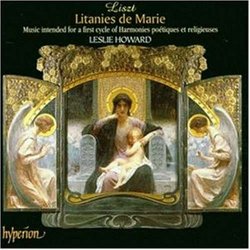| All Artists: Franz Liszt, Leslie Howard Title: Liszt: Litanies de Marie Members Wishing: 0 Total Copies: 0 Label: Hyperion UK Release Date: 11/11/1997 Album Type: Import Genre: Classical Styles: Chamber Music, Forms & Genres, Short Forms, Suites, Historical Periods, Classical (c.1770-1830), Instruments, Keyboard Number of Discs: 1 SwapaCD Credits: 1 UPC: 034571171876 |
Search - Franz Liszt, Leslie Howard :: Liszt: Litanies de Marie
 | Franz Liszt, Leslie Howard Liszt: Litanies de Marie Genre: Classical
|
Larger Image |
CD Details |
CD ReviewsLiszt the Artisan Hexameron | 06/27/2007 (5 out of 5 stars) "Volume 47 in the already massive and luminous Hyperion series of Liszt's solo piano music is a valuable addition to the Liszt discography. Leslie Howard has once again dug deep into the Liszt oeuvre, truly unearthing (to the public at least) some fascinating music items. As Howard says in the opening of the CD's liner-notes, "the history of Liszt's Harmonies poetiques et religieuses is long and complex..." And although Howard has recorded other pieces relating to the Harmonies poetiques before, this Volume explores "music intended for a first cycle" that I find tremendously substantial.
I found it pleasantly surprising when listening to these pieces that they do not sound like compositional drafts. While the music content has an undeniable relationship with and certainly helped spawn the 1853 version of Harmonies poetiques, this 1847 cycle can exist independently from the 1853 version. Any listener familiar with the final version of Harmonies poetiques can easily hear significant differences between some of the corresponding pieces in this first cycle. "Miserere" for instance, is more thinly scored than its 1853 successor but emphasizes the already dramatic music with chilling block-chords in the bass. Another piece that differs greatly from the 1853 cycle is the "Prose des morts - De profundis," better known in its final version as "Pensee des morts." Accompanimental modifications are galore, but there is also an entirely new and extensive section of music attached to and weaved together with material from the 1853 version. In short, this earlier work goes beyond being a "first version" and is so unique by itself it need not be considered a basis for the "Pensee des morts." The first version of the "Andante lagrimoso," known here as "La lampe du temple," is probably the one piece most identical with its final version. Needless to say, the music contains some of Liszt's most beautiful piano writing. The two pieces that share a kinship with the 1853 "Benediction de Dieu dans la solitude" are also alike in content. Liszt's two versions, one simply known as "Prelude" to the Harmonies poetiques and the other renamed "Benediction" show an interesting evolution in the way Liszt re-clothes his thematic ideas. But even more extraordinary are the two pieces that never made it to the final 1853 version of the Harmonies poetiques; they are stunning discoveries. "Litanies de Marie," being the first, is an impressive and austere 13 minute-long excursion of mysterious religious zeal. Howard laments "it is a great pity that [Liszt] never returned to the work or else its future would have been more worthily assured." The second new piece that got lost in translation is the powerful "Hymne." Howard notes the "simple and grand hymn-like melody, swathed in robust arpeggios expressive of joy unclouded by doubt." "Hymne" is more extrovert and whole-heartedly Lisztian than the rest, but as an expressive piece of music, this mighty work is a veritable success. Bottom line: This first cycle of the Harmonies poetiques is absolutely breathtaking, especially considering the results of the second and final cycle. The differences in music material, from the alterations in texture to the alternative pianistic effects, is remarkable enough that these works, especially "Prose des Morts" can stand on their own without being referenced as early framework for the 1853 edition. Moreover, the two pieces in this first cycle that never made it to the 1853 Harmonies poetiques are magnificent. That they are being recorded for the first time is astounding and I implore the Lisztophile to hear these." |

 Track Listings (11) - Disc #1
Track Listings (11) - Disc #1